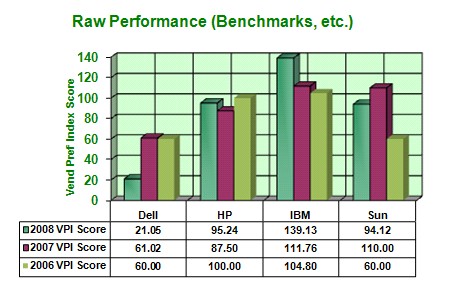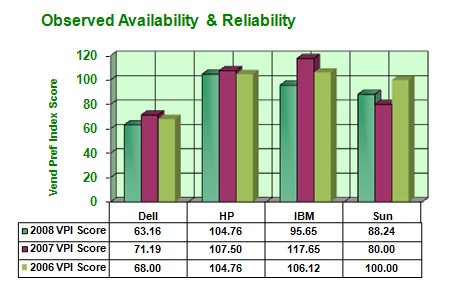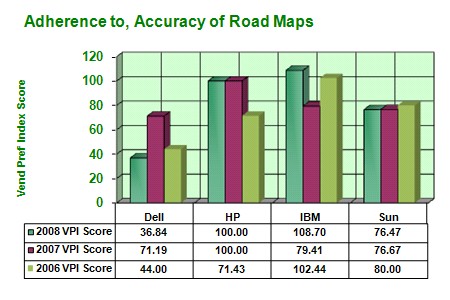This article is more than 1 year old
IBM, HP annoy server buyers less than Dell, Sun
x64 FAIL meter
The Performance Gap
"IBM is the perceived leader in performance, and HP leads in systems management," explains Olds. "Dell is seen as a provider of boxes with little to no differentiation. And while some Sun customers are zealous about Sun iron, the company has not made up the ground between itself and HP and IBM."
The difference in the raw performance across these four vendors that customers say their suppliers are delivering is widening. And as the numbers below show, there is quite a bit of differentiation among these four vendors, even given the commodity nature of the x64 server these days.

The differences in the VPI rankings for the four major x64 server vendors is similarly striking, and shows that perceptions among customers using a mix of different server products are hard to change, particularly when it comes to system reliability:

Now, Olds knows the difference between perception and reality, and says that the feature set between various x64 server makers is not that different. Dell systems are not that far behind. But he does believe that some vendors do a better job at stressing performance or availability features, and do a better job of marketing these features to customers. The marketing message is slippery, and if it didn't work, vendors wouldn't do it. For instance, IBM has pretty much owned the raw performance metric in the x64 server survey for the past three years. But when you ask customers about the observed performance of the machines in their data centers, IBM and HP have scored a VPI at 100 or higher each time, and Sun has done better than its raw performance metrics above show. Dell also did better, averaging around a 70 VPI across the three surveys. The gap between raw and observed performance is a measure of sorts of the effectiveness of benchmarketing.
If there is another area where HP and IBM are doing better than Dell and Sun, it is in systems management. In the 2008 survey, HP scored a 109.5 VPI on its system management tools (that would be Insight Manager and related tools) and IBM fell quite a bit, from a 114.7 VPI in 2007 with its Systems Director and related tools to a 96.65 VPI in 2008. But Dell rated only a 57.9 VPI in 2008 (up more than five points), and Sun, while up nearly 12 points, is still only at an 88.2 VPI with its systems management tools as rated by those polled by Gabriel Consulting.
Another issue that bothers customers is technology roadmaps. When they invest in a product line, they want to have a sense of what the future product line is going to look like. And as you might expect, HP and IBM seem to be doing the best job here, too. Take a gander at the data for the past three years:

Of course, in the case of the x64 server space, the roadmaps are driven mostly by chip makers Intel and Advanced Micro Devices, and when either of these two sneezes, the server vendors get the cold.
As in past surveys, most of the shops polled have x64 iron from multiple vendors. In the 2008 survey, 22 per cent of the shops polled had three different sever vendors, 37 per cent had four, and 22 per cent had five. Only 7 per cent reported having only one vendor, in fact. And it doesn't look like anyone is getting ready to pick one vendor and buy all their gear from that company, either.
"Since we have had two vendors back in the x86 days, people have been talking about standardizing on one set of products," says Olds. "And vendors have been talking about this, too. But it just ain't happening. Customers love a horse race when it comes to x64 servers." And that is particularly good news for the top four x64 server makers and their competitors, who also want to get a piece of the action. ®
